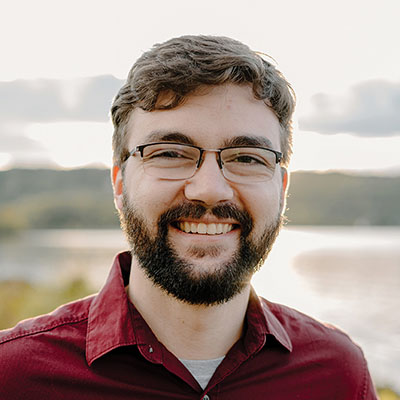ESF College Foundation
Student Profile David Harris
Tackling an Invasive Plant Problem with Beetles
By Danielle J. Gerhart
 David Harris (Ph.D. student, Environmental Biology) is playing a key role in research
focused on using beetles to biologically control the invasive plant swallow-wort.
David Harris (Ph.D. student, Environmental Biology) is playing a key role in research
focused on using beetles to biologically control the invasive plant swallow-wort.
Harris—a self-proclaimed “plant guy”—explained that the European native swallow-wort became a problem in the northeastern United States in the ʼ90s, following a pattern common to invasive species. As it remains a persistent threat, Harris is determined to discover whether the Chrysochus asclepiadeus leaf beetle has the potential to become a biological control agent. He is working under the guidance of his advisor, Dr. Dylan Parry, who specializes in invasion ecology, conservation, and disturbance.
“What happens frequently with invasives is theyʼre present for a long time not causing issues, and then either they build up a certain critical mass or something changes in the environment,” Harris explained. “This releases them and allows them to become problematic.”
Introducing an insect as a biological control agent demands years of meticulous research. Harrisʼs first task is to ensure the beetle itself wouldnʼt become invasive. While the beetles were considered potential natural enemies, research was essential to ensure they wouldnʼt harm other plants or creatures. This meant testing whether it would exclusively feast on the swallow-wort, which Harris is doing in the USDA APHIS-certified quarantine greenhouse atop Illick Hall.
Much of the groundwork to study the invasive plant started before Harris joined the project. With the support of the College Foundation, he was able to continue the research by traveling to Europe and collaborating with researchers in France and Switzerland.
So, why did Harris choose to study beetles?
“Iʼm drawn to invasive species dynamics and ecology,” he said. “I did my undergrad at Cornell in ornamental horticulture and liked the research. I saw on the Cornell job postings they needed a lab tech in the entomology department working with an insect pathologist. While there, I was given a lot of opportunities to do more than just technician work. That's what really got me more knowledgeable about and interested in invasive species.
Upon deciding to pursue his Ph.D., he was connected to Dr. Parry.
“ESF is focused on my interests and Dr. Parry does exactly the kind of work that I wanted to pursue further,” Harris said. “I chose ESF because it is only one of a few universities to have staff working on invasive species biological control research in a forest setting.”
With graduate student finances being modest, every bit of financial support, especially
scholarships, counts. It fuels his research, enables collaboration, and saves him
time and
resources to focus on the experimental elements of his research.
“The generosity of donors has allowed me to pursue a Ph.D. without worrying or struggling to make ends meet,” Harris said. “This gift has greatly helped me pursue my research in a very tangible way; without it, Iʼm not sure Iʼd be on my current path.”
Harrisʼs research continues and he intends on staying in Central New York once he completes his degree. As one of the areas in North America most impacted by invasive species, he sees it as his duty to help his home region do its best to ameliorate the damage and, ultimately, foster restoration.
